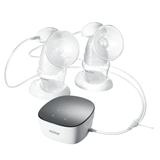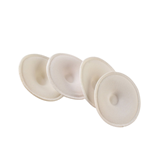There was no increase in risk in women who had taken multivitamins for less than three years compared to non-users, and the increase was only just statistically significant in women who took fewer than seven multivitamin tablets a week. (NHS, 2010)
Vitamin use in the study was based on self-reported questionnaire data taken at one point only. It is possible that some women may not have reported their supplement use accurately, or that their use changed over the ten-year follow-up period. This could potentially affect the results. (NHS, 2010)
Significantly, there was no significant increase in risk of breast cancer in women who took supplements containing specific vitamins (vitamins C, E, B-6 or folic acid) compared to those who did not take such supplements. This confirms the findings of a French randomised controlled trial (SU.VI.MAX) which found that a combination of vitamins C and E, B6, selenium and zinc did not affect the risk of breast cancer. (Galan et al., 2005) Some nutrients have individually been shown to reduce cancer risk. High folate intake, for example, has been associated with reduced risk of breast cancer in post-menopausal women. (Lajous et al., 2006)
The study by Larsson and Akesson was a cohort study, not a randomised, controlled clinical trial. The study was not designed to establish cause and effect, and the findings do not prove that vitamins are to blame for the increased incidence of breast cancer. The causality between taking multivitamins and breast cancer has not been confirmed in this study.
Also, even if the link was causal, these findings show that for any one woman, using multivitamins has a small effect on her risk of breast cancer, she noted. The lifetime probability of developing breast cancer in developed countries is about 4.8%, according to the American Cancer Society. However, the risk of developing breast cancer in this research was low, with only 2.8% of women affected.
In spite of the statement that the analysis took into account a number of risk factors for breast cancer, including age, education, history of benign breast disease, family history of breast cancer, number of children, age when first child was born, age at first period, age at menopause, use of oral contraceptives, use of hormone treatment after menopause, body mass index (BMI), physical activity, smoking, calcium supplement use and alcohol intake, it is possible that factors other than multivitamin use could have affected the results. The main author, Larsson pointed out in an email to Reuters Health, that it is possible that something they did not measure is responsible for the link.
The group who took multivitamins were more likely to have received post-secondary education, have a history of benign breast disease, have no children and to have used oral contraceptives and postmenopausal hormone replacement than women who did not use multivitamins. It is possible that the research identified a cohort at risk of breast cancer, namely career women who delay child birth by taking the oral contraceptive pill resulting in long periods of oestrogen dominance, who develops a history of benign breast disease and ultimately breast cancer.
Although there has been another study (Berube et al., 2008) suggesting a similar link, several other studies have found no association with the use of multivitamins and breast cancer. A large epidemiological study (37,920 US women aged > or = 45 years and free of cancer at enrollment) conducted by Harvard researchers found no overall association between multivitamin use and breast cancer risk but suggest that multivitamin use might reduce risk for women consuming alcohol or decrease risk of oestrogen receptor negative-progesterone receptor negative breast cancer. (Ishitani et al., 2008)
A Chinese study (Dorjgochoo et al., 2008) investigated the association between self-reported vitamin supplement use (multivitamin, A, B, C, and E) and breast cancer and the combined effect of vitamin supplements in relation to dietary vitamin intakes on breast cancer risk. The Shanghai Breast Cancer Study was a population-based case-control study involved 3,454 breast cancer cases and 3,474 controls.
Overall, breast cancer risk was not related to any vitamin supplement intake. However, a 20% reduction in breast cancer risk was observed with vitamin E supplement use among women with low-dietary vitamin E intake (OR = 0.8; 95% confidence interval (CI), 0.6-1.0). A non-significant 20% risk reduction was observed among vitamin B supplement users with low B dietary intake (OR = 0.8; 95% CI, 0.6-1.1). Frequent use of a vitamin B supplement was adversely associated with breast cancer risk among those with high dietary vitamin B intake (OR = 1.4; 95% CI: 0.9-2.1; P for interaction = 0.07). This study suggests that vitamins E and B supplements may confer protection against breast cancer among women who have low dietary intake of those vitamins.
The Women's Health Initiative involved 68,132 women who were followed for a median of eight years. Multivariate-adjusted analyses revealed no association of multivitamin use with the risk of cancer. After a median follow-up of 8.0 and 7.9 years in the clinical trial and observational study cohorts, respectively, the Women's Health Initiative study provided convincing evidence that multivitamin use has little or no influence on the risk of common cancers, CVD, or total mortality in postmenopausal women. (Neuhouser et al., 2009)
A Dutch study evaluated the impact of multivitamin use and risk of breast cancer in a case-control study.(Meulepas et al., 2009, Neuhouser et al., 2009) The study involved 2,968 cases of breast cancer diagnosed between 2004 and 2007 and an equal number of controls. This study found no association between multivitamin supplement use and breast cancer risk.
Finally, as stated on the Australian Cancer Councils website, it is important to keep the results of this study in perspective. The well-established risk factors for breast cancer i.e. obesity, physical inactivity and drinking alcohol are much more significant risk factors for breast cancer.(Cancer-Council, 2010)
Further research is needed to clarify whether there really is a link between multivitamin use and breast cancer risk and, if so, which component(s) of the multivitamin supplements are responsible.
For further information please visit Global Natural Medicine.
The article that the author is responding to can be found here.







-160x160-state_article-rel-cat.jpg)